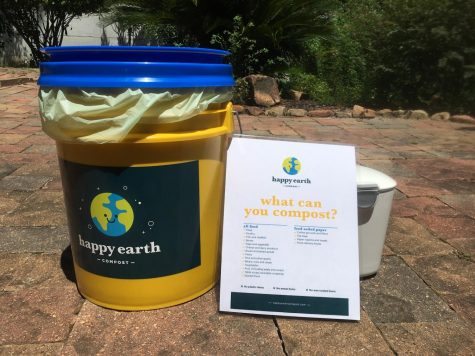Happy Earth Composting Service

A cheerful & smiley earth representing the company’s daily mission towards greater sustainability.
August 10, 2020
Happy Earth Compost serves as Houston’s first curbside compost service. Their concept is similar to that of a recycling or trash service, where they gather your compost materials at specific times each month to then turn it into a usable compost mix. Being a part of the Happy Earth Compost family does require you to pay a fee that varies based on the membership you select, but their concept helps the earth as well as helps limit your waste quantity. Along with the membership, Happy Earth sends finished compost mix that can be used to feed your garden or landscape with nutrient rich soil that will help support healthy plant growth and soil development.
The founder, Jesse Stowers decided that he had enough one day of the massive amount of trash his family was producing. He began playing around with at-home compost methods, but wanted to be able to compost eggs, meat, and dairy items as well which was a “no-no” for at-home composting. Stowers became interested in making his new found hobby of composting into a real business that is now helping Houston become more green and sustainable. He put his plan into action by starting to work with New Earth Compost based in Fulshear, TX, using their site as a location where he could drop off the waste. The company now partners with New Earth to create the compost that ends up on their customers doorsteps. Happy Earth Compost is utilized by over 350 homes in the Greater Houston area, with a possible expansion to College Station, TX. Starting July 31st my family became members of Happy Earth Compost and are shocked at the amount of compost and waste that ends up in our bucket.

The way the process works begins with a drop-off of your own personal compost bucket, that includes a sheet with instructions, a mini compost bin for your kitchen, and bags to store more compost. Everyday you’ll collect your compostable waste such as:
- Fruit & vegetable peels, cores, and leftovers
- Meat, poultry, fish & shellfish, and bones
- Cheese and dairy products
- Bread and baked goods
- Rice, grains, pasta, beans, nuts, and seeds
- Table scraps and plate scrapings
- Spoiled food
- Coffee grounds, tea bags, and filters
- Paper napkins and towels
- Pizza delivery boxes
Happy Earth offers several different membership options, starting with the most basic monthly pick-up option priced at $15/month and a bi-monthly option priced at $25/month. The company also offers weekly pickup, commercial pickup, and a $35 fee that allows for you to drop off your waste at select and local farmers markets around the Houston area. Just recently, on August 9th, Happy Earth launched a bi-weekly membership that will serve the Bryan and College Station area for $25/month. With an accommodation for larger families and groups, Happy Earth charges $5 for every extra bucket.
Compost is produced when organic matter is broken down with the presence of oxygen (aerobic) along with the help of fungi, microbes, actinomycetes (bacteria that look similar to fungi), and invertebrates such as spiders, earthworms, or centipedes. Composting involves a detailed and complex thermal breakdown process that involves several phases; mesophilic, thermophilic, and the curing & maturation phases. Throughout the composting process, the compost pile must reach high temperatures to kill off weed seeds and break down all other organic matter. Things like a specific carbon-nitrogen ratio are involved in the process as well. As stated above, composting is a complex process that involves careful management, temperature requirements, and various microorganisms. Benefits of composting? Well there are plenty:
- It cuts out a large portion of waste that would otherwise go to a landfill
- It provides soil with plentiful nutrients straight from your kitchen/household
- It can often reduce the need for pesticides or fertilizers
- It may lower the amount of pests and plant diseases
- It requires carbon to break down organic matter which helps remove the excessive amount of carbon that exists in our atmosphere
Having a curbside composting service at the touch of a button seems too good to be true, but Happy Earth facilitates an easy method to reduce waste and promote sustainability to the Greater Houston area. For more details check out: https://www.happyearthcompost.com/.
Works Cited
Cathey, Amber, and Pahriya Ashrap. “Trash to Treasure: The Incredible Benefits of Composting: The Pursuit: University of Michigan School of Public Health: Environmental Health: Innovation: Nutrition: Pollution.” The Pursuit | University of Michigan School of Public Health | Environmental Health | Innovation | Nutrition | Pollution, sph.umich.edu/pursuit/2019posts/benefits-of-composting.html.
Goltzman, Jillian. “Family-Owned Composting Startup Redesigns How Houston Disposes of Waste.” InnovationMap, InnovationMap, 7 Aug. 2020, houston.innovationmap.com/jesse-stowers-happy-earth-compost-launches-in-houston-2646872910.html.
Joseph, Kristynn. “Everything You Need to Know about Compost.” Untamed Science, 23 Jan. 2019, untamedscience.com/biology/ecology/ecology-articles/the-science-of-compost/.
Sherman, Rhonda. “The Composting Process.” Carolina Farms Stewards, www.carolinafarmstewards.org/wp-content/uploads/2016/11/Composting-Process-CFSA-Conf-2016-Sherman.pdf.


